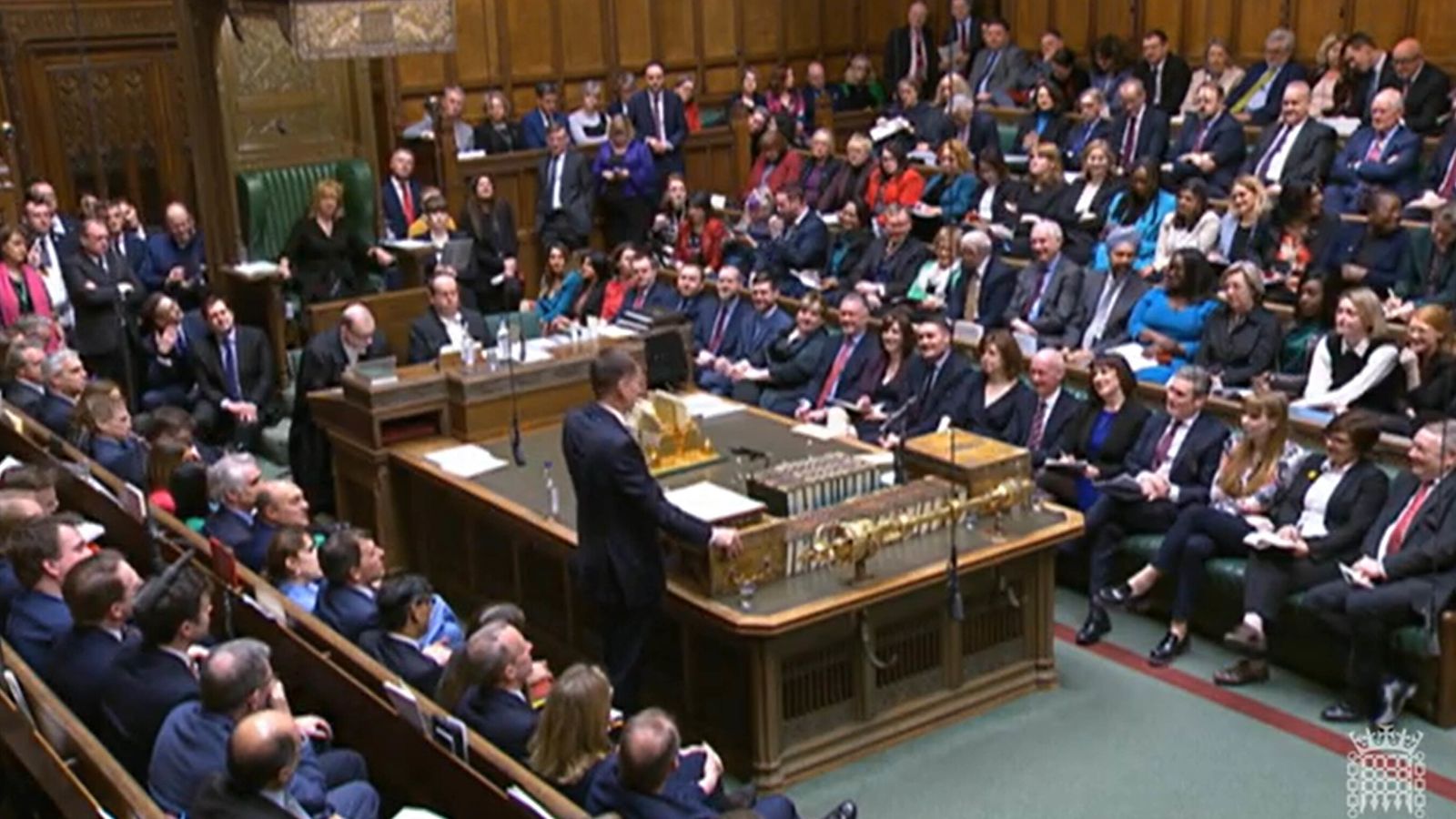Budget 2023: UK economy will avoid recession in 2023 and inflation set to plummet, says chancellor

Jeremy Hunt said the British economy is “proving the doubters wrong” and will avoid recession, as he delivered his first full budget speech to Parliament.
The chancellor said the government’s plan for the economy was “working” as he announced what he called a “budget for growth”.
He said forecasts from the Office for Budget Responsibility (OBR) showed the UK would avoid recession – two quarters of negative growth – in 2023, despite previous predictions.
However, the economy will still contract overall this year by 0.2%
Politics live: Hunt delivers spring budget in the Commons
The OBR forecasts also said inflation in the UK would fall from 10.7% in the final quarter of last year to 2.9% by the end of 2023.
Mr Hunt said it showed Rishi Sunak’s goal of halving inflation this year would be met, but he added: “We remain vigilant and will not hesitate to take whatever steps are necessary for economic stability”.
A number of other new plans were also unveiled, including:
The chancellor also said £11bn will be added to the defence budget over the next five years – following an announcement from earlier this week – saying it would be nearly 2.25% of GDP by 2025.
Advertisement
He told the Commons: “In the face of enormous challenges I report today on a British economy which is proving the doubters wrong.
“In the autumn we took difficult decisions to deliver stability and sound money. Since mid-October, 10-year gilt rates have fallen, debt servicing costs are down, mortgage rates are lower and inflation has peaked.
“The International Monetary Fund says our approach means the UK economy is on the right track.”
Some policies were revealed ahead of his speech, including keeping the cap on energy prices at £2,500 for a further three months, despite a planned rise to £3,000 in April, and 12 new investment zones.
Sky News also reported last night his promise to provide 30 hours of childcare a week to parents of one and two-year-olds, and to give a further cash injection to the sector to increase the availability of existing free childcare for three to four-year-olds.
But there was more under Mr Hunt’s “three E’s” philosophy – enterprise, employment and education.
They included:
The chancellor confirmed widely reported plans to abolish the Work Capability Assessment in Great Britain and “separate benefit entitlement from an individual’s ability to work” .
He promised a new programme called Universal Support, describing it as “a new, voluntary employment scheme for disabled people where the government will spend up to £4,000 per person to help them find appropriate jobs and put in place the support they need”.
And he said there would be a £400m to help those who are forced to leave work because of a health condition to get support in the workplace.
Mr Hunt confirmed he would keep the incoming rise in corporation tax – from 19% to 25% – despite anger from some of his own backbenchers.
But instead introduced a new benefit where for every single pound a company invests in equipment can be deducted in full and immediately from taxable profits – “a corporation tax cut worth an average of £9bn a year for every year it is in place”.
In what appeared to echo recent Labour policy, he also announced continued state-financed investment in nuclear power and the launch of Great British Nuclear, saying the public body will “bring down costs and provide opportunities across the nuclear supply chain to help provide up to one quarter of our electricity by 2050”.
Today’s statement was Mr Hunt’s first full budget as chancellor – having been brought in by Liz Truss to reverse a number of measures from her disastrous mini-budget last October and kept on by Rishi Sunak after he took over as prime minister.
It came against a backdrop of mass industrial action, with hundreds of thousands of workers today staging what is believed to be the biggest walkout since the current wave of unrest began.
Teachers, university lecturers, civil servants, junior doctors, London Underground drivers and BBC journalists are among those taking to picket lines around the country amid widespread anger over pay, job security, pensions and conditions.
Labour’s shadow chancellor, Rachel Reeves, said ahead of the budget that it was “an opportunity for the government to get us off their path of managed decline”.
She added, if her party were in power, their focus would be on securing the highest growth in the G7.
“Our plan will help us lead the pack again, by creating good jobs and productivity growth across every part of our country, so everyone, not just a few, feel better off,” she added.
Our politics, business and finance reporters will be hosting a Q&A after the budget statement. To submit a question, click here.